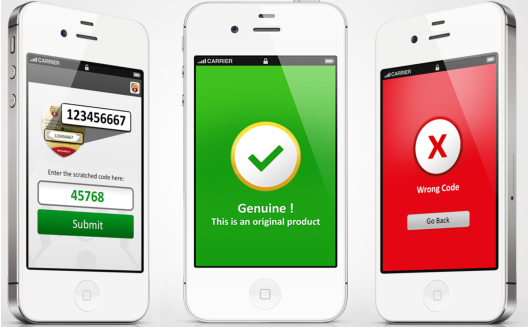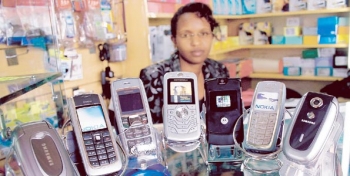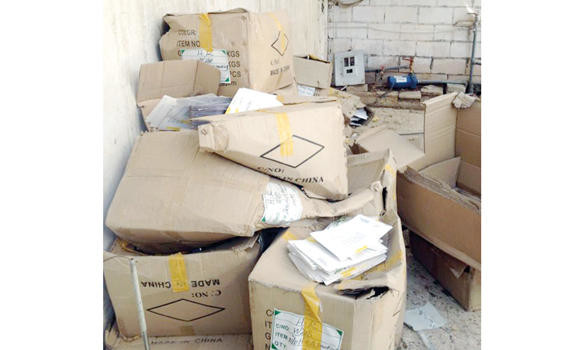
Egyptian startup Asly fights counterfeit vaccines to save lives and money
When Tamer Ahmed was a child, his three year-old sister died because she had been given a counterfeit vaccine. Years later, still reeling from the loss, he and his partners Mohamed Hal and Mohamed Al Mughni, launched Asly from Egypt in an attempt to ameliorate this region-wide problem. The startup Asly wants to “offer a radical solution to the problem of fake products, and make the MENA region the [safest] shopping place in the world.” This goal, without any doubt, is very ambitious, especially given the statistics. Ahmed tells me that around 50% of pharmaceuticals in the Arab world are fake; 40% in Saudi Arabia, more than 50% in Egypt, and between 20 and 25% in the UAE. These frauds not only lead to needless deaths, especially in the case of fake malaria pharmaceuticals, but they also cause financial losses for pharmaceutical companies
http://www.wamda.com/2014/03/could-a-mobile-service-offer-a-solution-to-counterfeit
Lear More
Counterfeit mobiles ‘cost $6 billion a year’
Black market sales of counterfeit and substandard mobile phones are a US$6 billion a year problem, says a new report into the global counterfeit phone market. Research from the Mobile Manufacturers Forum (MMF) says around 148 million counterfeit or substandard mobile phones were sold worldwide in 2013, mostly in developing countries. “They were sold through visible retail sites, unofficial retail outlets, online auction websites and in local black markets,” said MMF secretary general Michael Milligan. “With the average knock-off phone selling for around US$45, our conservative estimate of US$6 billion in illegal sales represents a massive financial loss for governments and the mobile phone industry. “Governments can combat the growing counterfeit phone problem with new technology which can identify substandard devices on the mobile network and permanently block users who don’t change to a genuine product.”
Lear MoreUN’s new counterfeit campaign
The United Nations Office on Drugs and Crime (UNODC) ‘Counterfeit: Don’t buy into organised crime’ initiative will boost awareness but is again taking the opportunity to urge organisations to review brand protection and authentication strategies and, if necessary, redouble their efforts to stem ‘the massive worldwide problem’ of counterfeit goods. The UNODC’s campaign highlights the link between organised crime and the trade in counterfeit goods, which it says amounts to US$250 billion a year. Fraudulent goods also present a serious health risk to consumers. Criminal activity in this area is big business: the sale of fraudulent medicines, for example, from East Asia and the Pacific to South-East Asia and Africa alone amounts to some US$5 billion per year. Counterfeiting touches virtually everyone in one way or another, posing a serious risk to health and safety – but the figure reported by the UNODC could be just the tip of the iceberg. Unfortunately, the true cost could be even higher, because it’s difficult to put a price on a global problem and account for the damage caused by counterfeiting to corporate reputations and the loss of market share.
http://www.thedrinksreport.com/guest-columns/2014/71-un-s-new-counterfeit-campaign.html
Lear MoreTata Motors intensifies campaign against counterfeit spares
Tata Motors has commenced a systematic multi-pronged campaign against the sale of spurious spare parts to protect its customers from the threat of counterfeit spares being sold under the brand name of Tata Genuine Parts.The company launched raids across the country to disclose the blooming business of spurious parts in India. Around 125 raids have been conducted across the nation and in Mumbai and nearby places only, 33 successful raids have been conducted.Tata Motors’ TGP team along with IPR enforcement, copyrights protection agencies and legal team, have been working together to recognize the manufacturing units and selling outlets in various major cities in In
Lear More
NOW, FARM EQUIPMENT SPARES WITH SECURITY FEATURES
Farm equipment manufacturer new Holland fiat (India) is planning to sell components with security features similar to those found in currency notes. The move is intended to deter sales of counterfeit spare parts. To begin with, the company intends to ship every single product with a hologram that can be identified under ultra violet (UV) light. Further, it will put as many as eight different identification marks on each one of its nearly 8,000 components sold through dealer networks.
“These features will be introduced this month, starting with 3,000 fast moving parts such as filters. The UV lights to authenticate the parts are not expensive, they come at 50,” new Holland fiat managing director Rakesh Malhotra told business line in an interview. “We will provide the UV pens to our dealers, while we will also educate our dealers, stockists, mechanics and even customers about these features,” Malhotra said.
Grey market
While this will go a long way in helping customers buy genuine products, the company will incur an “incremental” additional cost, which will not be passed on, he added. For the industry, fake spares is a serious issue as it tarnishes the manufacturer’s goodwill, affects the economy , results in jobs losses and compromises the safety of the vehicle. The most duplicated products include clutch parts, filters (air, oil and fuel), belts, liners and brake pads, gaskets and gear parts among others.
The auto component industry loses 29.6 per cent of its sales to the grey market, according to a FICCI–CASCADE study, ‘invisible enemy’, in 2012. This amounts to about 9,198 crore of the total estimated industry size of 31,046 crore.
New Holland fiat (india), which in 2013 got about 4-5 per cent of its total turnover from the sale of spare parts, has also been battling the grey market issue for some time. In 2012, it sold 32,000 tractors, 92 balers and 25 sugarcane harvesters in India.
Lear More

1.5 million Counterfeit products seized
The Ministry of Commerce and Industry has confiscated over 1.5 million pieces of counterfeit electrical equipment, including mobile phone chargers which were in violation of local specifications.
The counterfeit items were seized following a raid on a villa in central Riyadh, which had been converted into a warehouse by a commercial establishment. These products, which are hazardous to consumers, have been confiscated and the villa sealed, a statement by the ministry said.
The ministry said it received a complaint from a citizen saying he suspected the villa was being used as a warehouse for counterfeit electrical equipment, which were being supplied to commercial stores in Riyadh.
http://www.arabnews.com/news/534026
Lear MoreCounterfeit luxury goods move further upmarket in China
When people in China carry designer bags bearing the logos of Louis Vuitton or Gucci, they are often asked whether they authentic or counterfeit. Now the country’s makers of counterfeit luxury goods go a step further by offering “tailor-made” services and have even opened “high-end private clubs” on social media sites, our sister paper Want Daily reports. Little Min, manager of a luxury bag shop in Haikou’s Top United, sells various levels of counterfeit luxury bags and even offers tailor-made counterfeit bags priced atmore than 8,000 yuan (US$1,300), or even 10,000 yuan (US$1,650) each, according to a Beijing media report. Min said her shop can offer a tailor-made Hermes Crocodile Birkin Bag, a genuine edition of which is sold for more than 100,000 yuan (US$16,500), but the counterfeit she sells is such a fine imitation, complete with identification certificate, that not even experts can tell the difference, she says. The counterfeit bag sells for less than half the price of the genuine article.
Lear MorePolicymakers must address the growing counterfeit drug menace
Today, when we Americans swallow a pill from a bottle that was filled by our local pharmacy, we tend not to give it much thought. We trust that the pills are what the doctor ordered, will do what they’re intended, and will be safe. But it is not that way everywhere in the world, and there are no longer any guarantees even in the United States.
The idea of compromised prescription medicines is difficult for many Americans to grasp. Because our drug system is so tightly regulated, there is no place where medicines are safer and more reliable. As the U.S. Food and Drug Administration (FDA) continually refines and improves the way it reviews and certifies the safety of medicines, the end result is that the U.S. supply chain is the gold standard of drug safety. People living in certain other parts of the world don’t have it so good. While data remains scarce, the World Health Organization estimates that upwards of 30 percent of the drug supply in some developing nations is counterfeit.
Lear MoreFake products in high demand
The Indonesian Anti-Counterfeiting Society (MIAP), the Food and Drug Monitoring Agency (BPOM) and the US Embassy have stepped up efforts to raise awareness about the dangers of counterfeit medicine and cosmetics. MIAP chairperson Widyaretna Buenastuti said such awareness was very important to stop the distribution of fake drugs and cosmetics as it could reduce the demand.
“When we reduce the demand, we automatically reduce the distribution as the producers stop producing them. This is what we will be doing so that fake products will have no place in the country,” Widyaretna said. BPOM chairman Roy Sparringa said he supported the MIAP campaign, since counterfeit drugs and cosmetics could be harmful to health and could result in death.
http://www.thejakartapost.com/news/2014/02/28/demand-fake-products-remains.html
Lear More
Businesses That Copy Oscar Dresses Face Counterfeiting From Chinese Websites
Omid Moradi will gather with his family for dinner and snacks this Sunday while they all watch the Academy Awards, as they do every year. His four daughters love to watch the parade of red carpet dresses, but they’re not the only ones who will be focused on fashion as the glamorous event unfolds. As the CEO of Faviana, a Manhattan-based designer gown shop, Moradi has a lot to think about besides which movie will win Best Picture. The 22-year-old business has made a name for itself offering “bling on a budget,” designs inspired by celebrity-wear, catering to customers who want to look like a million bucks without paying more than a couple hundred.
http://www.ibtimes.com/businesses-copy-oscar-dresses-face-counterfeiting-chinese-websites-1558598
Lear More


